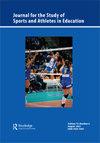The effect of SARS-COV-2 on senior college athletes’ retirement considerations
IF 1
Q3 EDUCATION & EDUCATIONAL RESEARCH
Journal for the Study of Sports and Athletes in Education
Pub Date : 2022-01-18
DOI:10.1080/19357397.2022.2026112
引用次数: 0
Abstract
ABSTRACT While there are studies that qualitatively examine athletes’ retirement experiences post retirement [e.g. Lavallee & Robinson, 2007. In pursuit of an identity: A qualitative exploration of retirement from women's artistic gymnastics. Psychology of Sport and Exercise, 8(1), 119–141; Torregrosa et al., 2015. Olympic athletes back to retirement: A qualitative longitudinal study. Psychology of Sport and Exercise, 21, 50–56; Tshube & Feltz, 2015. The relationship between dual-career and post-sport career transition among elite athletes in South Africa, Botswana, Namibia and Zimbabwe. Psychology of Sport and Exercise, 21, 109–114; Warriner & Lavallee, 2008. The retirement experiences of elite female gymnasts: Self identity and the physical self. Journal of Applied Sport Psychology, 20(3), 301–317], a unique opportunity was presented during the COVID-19 pandemic to gather data from NCAA Division II baseball players who faced potential involuntary sport retirement at roughly the same time for the same reason, thus eliminating multiple variables that are common in athlete retirement research. This study aimed to explore the experiences of senior college athletes using interpretative phenomenological analysis. Data analysis revealed that while the college athletes reported experiencing negative cognitive and emotional responses, they also identified positive aspects of this unexpected situation, thought of others during this unprecedented time, and remained future-oriented. Although there is still more to learn about the impact of sudden sport retirement on athletes, this exploration offered optimism that some athletes can be surprisingly resilient when faced with unexpected adversity at the end of their athletic careers.SARS-COV-2对高校高级运动员退役考虑的影响
摘要尽管有一些研究对运动员退役后的退役经历进行了定性研究[例如,Lavallee&Robinson,2007。追求身份:从女子艺术体操退役的质的探索。《运动与锻炼心理学》,8(1),119–141;Torregrosa等人,2015年。奥运会运动员重返退役:一项定性纵向研究。运动与锻炼心理学,21,50-56;Tshube和Feltz,2015。南非、博茨瓦纳、纳米比亚和津巴布韦精英运动员的双重职业与运动后职业转变之间的关系。《运动与锻炼心理学》,2109-114;Warriner和Lavallee,2008年。优秀女子体操运动员的退役经历:自我认同与身体自我。《应用运动心理学杂志》,20(3),301–317],在新冠肺炎大流行期间,提供了一个独特的机会来收集NCAA二级棒球运动员的数据,这些运动员因相同的原因在大致相同的时间面临潜在的非自愿运动退役,从而消除了运动员退役研究中常见的多个变量。本研究旨在运用解释性现象学分析的方法,探究高校高年级运动员的运动体验。数据分析显示,尽管大学生运动员报告称经历了负面的认知和情绪反应,但他们也发现了这种意外情况的积极方面,在这前所未有的时期为他人着想,并保持着面向未来的态度。尽管关于突然退役对运动员的影响还有更多的需要了解,但这一探索提供了乐观的态度,即一些运动员在运动生涯结束时面临意外逆境时,会有惊人的韧性。
本文章由计算机程序翻译,如有差异,请以英文原文为准。
求助全文
约1分钟内获得全文
求助全文
来源期刊

Journal for the Study of Sports and Athletes in Education
EDUCATION & EDUCATIONAL RESEARCH-
自引率
0.00%
发文量
25
 求助内容:
求助内容: 应助结果提醒方式:
应助结果提醒方式:


